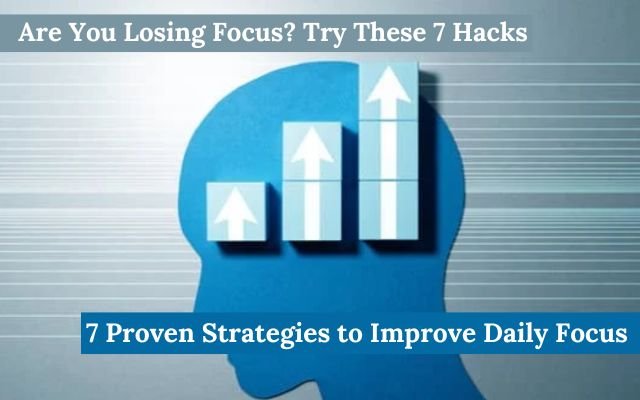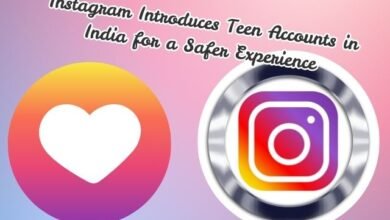7 Easy Tips to Improve Daily Focus
How to Achieve Your Full Potential — Every Day: Easy Tips to Improve Daily Focus and boost productivity for a better you!

Managing your daily focus can feel like a rollercoaster — some days you’re sharp and focused, other days staying on track is a challenge. It made me think, what are some easy tips to improve daily focus?
In this post, we’ll go over simple tips to help you stay focused every day. These tips will help you stay focused, increase your productivity and achieve those goals.
Table of Contents
Simple Strategies to Take Control of Your Daily Focus
After reading a number of books, blogs, and podcasts and thinking back on my own experiences, I’ve found seven easy methods that can significantly increase your focus.
These tips can help anyone who wants to increase their focus during the day but this blog is especially beneficial for those with ADHD.
Curious to learn more? Let’s get started!
Simple Ways to Improve Daily Focus
1. Start Your Morning with Low-Dopamine Habits
To improve daily focus, a low-dopamine morning routine is incredibly helpful. This idea comes from neuroscientist Andrew Huberman and is especially useful for people with ADHD, but it can work for anyone.
People with ADHD have lower dopamine levels, which is the brain chemical that motivates us to act. When we don’t have enough dopamine, even simple tasks can feel overwhelming. That’s why boring tasks feel so hard — they don’t give us a dopamine boost.
The problem is, every time we get a dopamine spike (like checking our phones or eating sugary food), there’s a crash afterward. Each crash lowers our dopamine baseline even more, making it harder to focus later.
Let’s look at a typical morning:
- Wake up & immediately grab your phone (dopamine boost 🚀)
- Sip on a coffee or another caffeinated drink (dopamine boost 🚀)
- Have a large, filling breakfast (dopamine boost 🚀)
- Play music while getting ready (dopamine boost 🚀)
- Rush through your morning routine (dopamine boost 🚀)
Your brain gets overloaded with dopamine and craves more which makes it difficult to concentrate on easy tasks that don’t offer same thrill.
To avoid this, try a low-dopamine morning:
Tips for a Low-Dopamine Morning:
- Stay away from your phone. Leave it in another room if you can.
- Wait to drink coffee. Give yourself some time before having it.
- Hydrate first. As soon as you wake up, have a full glass of water.
- Start with something calming. Read a book or do a quiet activity to clear your mind.
- Eat light for breakfast. Choose something small to avoid a big energy spike.
By reducing those dopamine spikes early on, you can keep your brain more balanced and make it easier to focus on tasks throughout the day. Simple changes can have a major difference!
2. Try Meditation
My ability to concentrate has much increased as a result of meditation, especially when I’m easily distracted. Anyone who wishes to clear their mind or start their day off on a positive note can benefit from this exercise.
The basic idea of meditation is to focus your thoughts and increase your awareness of the here and now. Regular meditation practice helps strengthen brain areas related to improved focus and attention, including the prefrontal cortex and hypothalamus.
Starting a meditation practice might feel difficult at first, and that’s completely normal. In today’s fast-paced world, our minds are accustomed to constant stimulation and distractions. It’s essential to keep in mind that there’s no right or wrong way to meditate.
- Duration: You can meditate for as little as 5 to 10 minutes. Even short sessions can be effective.
- Position: You can either close your eyes or focus on a specific object in front of you.
- Silence or Sound: You can choose to sit in silence, or you can repeat a calming word or phrase throughout your session to help keep your mind anchored.
I suggest giving app Oak Meditation & Breathing a try if you’re searching for useful tool. I’ve been using this simple, free app for more than two years. It keeps things simple without overburdening you with alternatives which is what I adore about it. My approach to meditation has completely transformed as a result of using this app; it’s now simpler & more pleasurable to incorporate into my daily practice.
3. Start Writing Things Down
One of my favorite tips for staying focused every day is to write things down, a piece of advice I got from someone very special: my dad.
Back in 2004, when I was bonding with my dad over computer time in India, I didn’t realize how important this advice would become. After I graduated from college, my life felt chaotic, especially with my ADHD. I reached out to my dad, who also deals with ADHD, to ask for tips on how to stay organized. His comment, “You need to write things down,” has stayed with me.
He meant this quite literally. Even though I had spent years writing papers and assignments, he suggested a different approach to writing. He told me to go on Amazon, buy a Black n’ Red Notebook and a good pen, and start writing everything down.
First page of my notebook was dedicated to my life’s goals and surprisingly, within a couple of years, I accomplished about 80% of them.
Benefits of Writing Things Down
Writing offers numerous advantages:
- Enhances Clarity: Writing helps you slow down your thoughts so you can think clearly about what matters.
- Boosts Concentration: Focusing on your writing helps you pay better attention to your tasks.
- Improves Memory: Writing makes it easier to remember information & keep it in your mind for longer.
Since I started this practice six years ago, I’ve noticed that writing has made me more productive, thoughtful, calm and organized. Key is not just to write but to make it a regular habit.
For capturing my thoughts, I now use the Twos App. This app has a simple system of Days, Lists, and Things, making it feel almost like writing on paper, but it also includes helpful features:
- Automatic Reminders: If I type “Call mom tomorrow,” it automatically sets a reminder for me.
- Keep Unfinished Tasks: This feature ensures that I never leave behind an unfinished task.
- View Past Notes: I can look back at things I’ve written weeks, days, months, or even years ago.
I use Twos for everything—from thoughts and ideas to to-do lists, reminders, birthdays, grocery items, meeting notes, jokes and memories. It has never let me down.
The Twos app is a great tool to use if you’re looking for a quick & easy way to start jotting things down. It can assist you in maintaining attention and organization throughout your day!
4. Get Moving: Why Exercise Matters
We move our bodies to slow down our minds, as my friend Fletch Barnes puts it. This concept emphasizes the mental health benefits of exercise.
How Exercise Benefits Your Brain
Exercise benefits not only your physical health but also your mental health. Your heart pumps more blood during exercise, which supplies your brain with nutrition and oxygen. Better brain health results from this increase in blood flow, which supports attention, memory & problem-solving.
Why Exercise is Good for ADHD
For people with ADHD, exercise can be especially helpful. It helps maintain the dopamine balance in the brain. Dopamine is one chemical that affects focus and attention. By controlling dopamine, exercise can help reduce the symptoms of ADHD and enhance focus.
Easy Ways to Get Moving
Long or tough workouts are not necessary for getting the benefits of exercise. Your ability to concentrate during the day can be improved by any type of movement. Here are some easy things you can do:
- Running or Jogging: A great way to get your heart pumping and clear your mind.
- Walking: Easy to do & a good way to add movement to your day.
- Short Workouts: Quick exercises like push-ups or jumping jacks can be done anywhere.
- Yoga or Stretching: These can help you relax & improve your flexibility.
Feeling more focused and energized can be achieved by including any of these activities into your regular routine. Thus, remember that physical activity is a potent approach to improve your focus and mental clarity whether it’s a jog, a brisk stroll or a few fast exercises!
5. Limit Apps and Social Media for Better Focus
Many apps and social media platforms are designed to give you quick bursts of pleasure (dopamine), making you want to check them often throughout the day.
How Social Media Affects Your Time
For example, I discovered that Twitter, which is now known as X, keeps track of how much time users spend on the site. This metric aids the $44 billion corporation in determining how to maintain employee engagement. X is more successful the more time you spend with them. Regretfully, this implies that X may divert your attention from more worthwhile and healthful pursuits.
Understanding App Addiction
Apps can be very addictive. They are designed to capture your attention and keep you scrolling. Sometimes the desire to check the applications again persists even after you’ve closed them for a few hours. Your ability to concentrate may be harmed by this ongoing distraction.
Tips for Reducing Distractions
To help improve your focus, it’s important to limit your use of these apps. Here are some easy ways to do that:
- Remove Apps from Your Home Screen: Hide apps you check often to make them harder to find.
- Log Out of Accounts: Logging out can add a step that makes you rethink logging back in.
- Set Time Limits: Use your phone’s features to limit how long you can use certain apps each day.
- Turn Off Notifications: Disable alerts so you aren’t constantly interrupted by messages or updates.
- Schedule Phone-Free Times: Pick specific times during the day when you won’t use your phone or check social media.
You can improve your focus & spend more time on important things by making it more difficult to scroll aimlessly and cutting down on the amount of time you spend on these apps. Reducing social media and app distractions can improve your productivity and lead to a more balanced, healthy lifestyle.
6. Easy Ways to Boost Your Focus
Some natural meals can provide a short, one to two-hour boost in focus if you’re looking to increase it. Important vitamins included in these foods support brain function.
Key Vitamins for Focus
Two important types of vitamins for focus are B vitamins and vitamin C. Here’s how they help:
- B Vitamins: These vitamins are important for your brain. For example:
- Vitamin B6 helps make brain chemicals that improve your mood and focus. If you don’t get enough B vitamins, you might feel tired and have trouble concentrating.
- Vitamin C: This vitamin helps your immune system and can also lift your mood. When you feel good it’s easier to focus.
Foods to Boost Your Vitamins
You can get these vitamins from natural foods. Here are some good choices:
- Fruits: Oranges & lemons have a lot of vitamin C. Bananas are a good source of vitamin B6.
- Vegetables: Spinach and kale are rich in B vitamins. Bell peppers also have vitamin C.
- Whole Grains: Brown rice, quinoa, and whole wheat bread are great sources of B vitamins.
- Nuts and Seeds: Almonds and sunflower seeds are healthy snacks full of B vitamins.
- Beans and Lentils: These are high in B vitamins and can be added to salads or soups.
What to Know
Natural foods are usually safe and helpful. Not everyone feels the same effects from vitamin supplements. Some people may notice a difference in focus, while others might not.
Some supplements may also cause your urine to develop a bright yellow color. This is natural and simply indicates that your body is eliminating excess vitamins.
You can improve the health and focus of your brain by eating more fruits, veggies and whole grains. Try including these foods in your diet to improve your ability to focus!
7. Avoid Substances for Better Focus
From my experience, substances like sugar, alcohol, and caffeine can greatly affect your focus. Here’s what I’ve learned:
Impact on Focus: People with ADHD are especially sensitive to these substances because they can quickly raise dopamine levels, which can lead to unhealthy habits. While little bit may give a temporary boost, long-term effects can hurt your ability to concentrate.
How Substances Affect the Brain: Many of these substances can disrupt the natural balance of chemicals (neurotransmitters) in your brain. When you avoid them, you help keep this balance, which is important for staying focused and alert.
Benefits of Staying Away: Benefits of Staying Away: Avoiding mood-altering substances can help your brain work better and keep you focused. You may think more steadily as a result which will increase your productivity all day. Thus, limiting your intake of sugar, alcohol, and caffeine can be a simple yet powerful strategy to improve your focus.
- 10 Surprising Psychological Facts About Human Behavior You Didn’t Know
- The Science Behind Sleep: Why You Need It
- Researchers capture never-before-seen view of gene transcription
Conclusion
I hope that these tips are useful to you! With so many distractions from social media, it can be difficult to maintain focus, so we all need a little help.
Don’t try to change everything at once. It’s better not to feel overwhelmed or burnt out.
Pick a few tips that you like, try them out for a few days or weeks, and see which ones work for you.
Here’s a quick checklist to remember:
- Save this list for later
- Look at it when you need a reminder
- Change the tips to fit your goals as you practice
If you have any questions or suggestions, I’d love to hear from you! Thanks for reading, and I hope you have a great week filled with focus and positivity.



